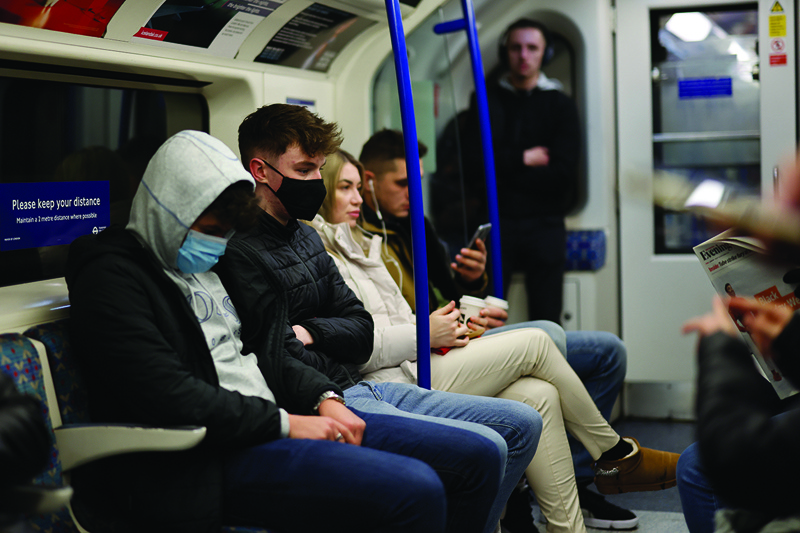 LONDON: Passengers, some wearing face coverings to combat the spread of COVID-19, travel on the London underground in central London yesterday.-AFP
LONDON: Passengers, some wearing face coverings to combat the spread of COVID-19, travel on the London underground in central London yesterday.-AFPTHE HAGUE: A new, heavily mutated COVID-19 variant spread across the globe yesterday, shutting borders, renewing curbs, and sparking fears for the fight against the nearly two-year-old coronavirus pandemic. Dubbed Omicron, the strain has cast doubt on global efforts to battle the pandemic because of fears that it is highly infectious, forcing countries to reimpose measures many had hoped were a thing of the past.
Dutch health authorities said they had identified at least 13 cases of Omicron among 61 quarantined passengers who tested positive for coronavirus after arriving from South Africa. "The investigation has not yet been completed. The new variant may be found in more test samples," the National Institute for Public Health warned.
Britain's government yesterday defended the pace and scale of its response to the new Omicron strain of COVID-19 as officials reported a third case of the emerging variant, and warned of more to come. Health Secretary Sajid Javid said mandatory mask-wearing would return to shops and public transport in England tomorrow, but told families to plan for Christmas "as normal", despite new rules to combat Omicron.
Also effective tomorrow, the government's website is instructing all passengers entering the UK to take a PCR test for COVID-19 two days after their arrival, and to self-isolate until the receive a negative result. Morocco will halt incoming passenger flights for two weeks starting today night amid concern over the spread of a new, heavily mutated COVID-19 variant dubbed Omicron, a government committee said. "The decision has been taken because of the quick spread of the new COVID variant, Omicron, namely in Europe and Africa, and in order... to protect the health of Moroccan citizens," the committee tasked with overseeing Morocco's COVID response said in a statement.
Despite the alarm, in Austria tens of thousands rallied to protest against the government's introduction of compulsory vaccination-the first EU country to do so. Chancellor Alexander Schallenberg said it was "a minor interference" compared to the alternative for a country with one of the lowest vaccination rates in Western Europe.
With many European nations, including Germany and France, already bringing back curbs to counter surges in infections, Swiss voters broadly backed a proposed COVID pass law in a referendum yesterday. In Britain, Health Secretary Avid Javid said new COVID rules will be enforced from tomorrow. Mask-wearing will again be mandatory in shops and on public transport in England. All passengers arriving in Britain will have to take a PCR test and self-isolate until negative.
Scientists are racing to determine the threat posed by the heavily mutated strain-particularly whether it can evade existing vaccines. But a long list of countries have already imposed travel restrictions on southern Africa, where it was first detected, including key travel hub Qatar, the United States, Britain, Saudi Arabia, Kuwait and the Netherlands. Angola became the first southern African country to suspend all flights from its regional neighbors Mozambique, Namibia and South Africa.
'Very dangerous'
The arrival of the new variant comes just a month after Australia lifted a ban on travelling overseas without permission. Denmark confirmed its first Omicron infections, in two passengers who arrived on a flight from South Africa. The speed at which governments slammed their borders shut took many by surprise, with travellers thronging Johannesburg international airport, desperate to squeeze onto the last flights to countries that had imposed sudden travel bans. In Amsterdam, 61 passengers tested positive after arriving on two flights from South Africa in an ordeal one passenger described as "Dystopia Central Airline Hallway".
New York Times global health reporter Stephanie Nolen said passengers, including babies and toddlers, were crammed together waiting to get tested, and "still 30 percent of people are wearing no mask or only over mouth". Scientists in South Africa said they had last week detected the new B.1.1.529 variant with at least 10 mutations, compared with three for Beta or two for Delta-the strain that hit the global recovery hard and sent millions worldwide back into lockdown. The variant has also revived geopolitical fault lines exacerbated by the pandemic, with the US quick to hail South Africa's transparency-a thinly veiled jab at China's handling of information about the original outbreak.
US Secretary of State Antony Blinken on Saturday "praised South Africa's scientists for the quick identification of the Omicron variant and South Africa's government for its transparency in sharing this information, which should serve as a model for the world". South Africa had complained it was being unfairly hit with "draconian" air travel bans for having first detected the strain, which the World Health Organization considers a "variant of concern".
A South African doctor who raised the alarm over Omicron said yesterday dozens of her patients suspected of having the new variant had only shown mild symptoms and recovered fully without hospitalization. Angelique Coetzee, chair of the South African Medical Association, told AFP she had seen around 30 patients over the past 10 days who tested positive for COVID-19 but had unfamiliar symptoms.
"What brought them to the surgery was this extreme tiredness," she said, speaking from Pretoria, where she practices. She said this was unusual for younger patients. Most were men aged under 40. Just under half were vaccinated. They also had mild muscle aches, a "scratchy throat" and dry cough, she said. Only a few had a slightly high temperature. - AFP










